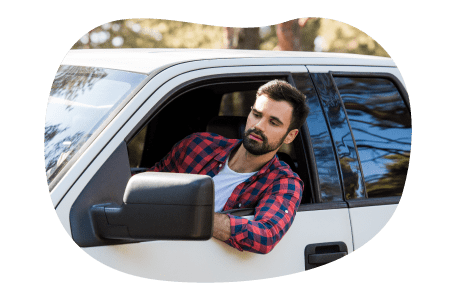
Why do hotshot truckers need insurance?
Your clients want their deliveries in a hurry, which is why you need protection against unexpected delays. Hotshot insurance coverage can help pay for lawsuits from dissatisfied clients, along with auto accidents and other losses.

Compare quotes from top providers
Insureon helps hotshot truckers compare quotes from the nation's leading insurance carriers.
Get several quotes with one easy application.
What kinds of insurance does a hotshot driver need?
These insurance policies protect against the most common risks in the hotshot trucking industry.
General liability insurance
This policy covers accidents that harm clients or their property, such as a slip-and-fall injury in your office or a dropped laptop. It's often required for a commercial lease or loan.
- Client bodily injuries
- Accidental damage to a client's property
- Libel and slander lawsuits
Business owner's policy
A BOP is a cost-effective way for hotshot drivers to buy general liability coverage and commercial property insurance together. It protects against third-party lawsuits and business property damage.
- Accidents that harm clients
- Stolen or damaged business property
- Business interruption insurance
Commercial auto insurance
Most states require commercial auto insurance for vehicles owned by a business. It helps pay for legal fees and other costs in the event of an accident involving your pickup truck.
- Damage caused by your truck
- Auto accident lawsuits
- Vehicle theft and vandalism
Workers’ compensation insurance
Most states require workers' comp for hotshot businesses that have employees. It also covers work-related medical bills for sole proprietors, which personal health insurance could deny.
- Employee medical expenses
- Disability benefits
- Lawsuits from employee injuries
Errors and omissions insurance
E&O insurance covers legal costs when a client sues over professional negligence, such as a late delivery that cost them money. It's also called professional liability insurance.
- Delays that cause financial loss
- Errors made by employees
- Breach of contract
Cyber insurance
This policy helps hotshot drivers recover financially from cyberattacks and data breaches. It's sometimes called cyber liability insurance or cybersecurity insurance.
- Ransomware attacks
- Data breach investigations
- Customer notification costs
How much does hotshot insurance cost?

Insurance companies look at different aspects of your hotshot trucking operations to determine your commercial insurance rates, including:
- Type of truck, such as pickup or box truck
- Type of trailer, such as bumper pull or gooseneck trailer
- The cargo you transport
- Number of employees
- Employee driving records
- Types of coverage purchased
- Policy limits and deductibles
- Claims history
How do I get hotshot trucking insurance?
It’s easy to find insurance solutions for hotshot drivers with Insureon. To get started, you’ll need to have some basic information about your business available.
Our application will ask you for your annual revenue and payroll, employees' driving history, and other business details. You can buy a policy online and get a certificate of insurance in three easy steps:
- Complete a free online application.
- Compare insurance quotes and choose a policy.
- Pay for your policy and download a certificate for proof of insurance.
Insureon's licensed insurance agents work with top-rated U.S. providers to find the best hotshot insurance for your business. Whether you’re a single owner operator or have a fleet of trucks, we'll help you find the right insurance coverage for your needs.
Verified business insurance reviews
Hear from customers like you who purchased small business insurance.
FAQs about hotshot insurance
Review answers to frequently asked questions about insurance for hotshots.
Do I need commercial auto insurance to cover my hotshot trucking business?
Yes, commercial auto insurance is a necessity for hotshot drivers. It's required in almost every state for business-owned vehicles, and covers costly work-related accidents that personal insurance won't cover.
The amount of commercial truck insurance you need depends on your state's laws, the weight of your hotshot loads, the materials you transport, and whether you drive across state lines. You also need to comply with Federal Motor Carrier Safety Administration (FMCSA) regulations, which may require additional insurance or a USDOT number.
Beyond state and federal trucking insurance requirements, it's important to have enough coverage so that your business can recover financially from an auto accident. Carrying only the minimum amounts could leave you paying a large amount out of pocket if a claim exceeds your policy limits.
Is a CDL required to drive a hotshot truck?
It's possible to work as a hotshot driver without a commercial driver's license (CDL), but having one gives you many advantages. For example:
- You can take on more jobs. State and federal regulations limit the type and weight of loads you can take on without a CDL. You'll need a commercial license to drive a bigger truck, transport heavier cargo, or deliver hazardous materials.
- Clients prefer hotshot drivers who have a CDL. Drivers with a commercial license will have an easier time getting contracts over someone with a basic license, as it shows they have experience and dedication.
- It's easier and cheaper to get insured with a CDL. Insurance companies are more likely to sell you a policy if you have a CDL, and they might even offer a discount on your insurance premium.
What other kinds of insurance does a hotshot driver need?
Hotshot drivers should consider the following coverage options to protect against other risks of their trade:
- Bobtail liability insurance provides auto liability coverage while you or an employee drives your truck without the trailer attached, such as between jobs.
- Motor truck cargo insurance, also called cargo coverage, covers the items transported by your business. It helps pay for cargo that's lost or damaged due to causes like fire, collision, or striking of a load.
- Trailer interchange coverage, or trailer coverage, provides physical damage coverage for your trailer. It insures your trailer while it's being transported by another trucker or trucking company outside of your own.
How can I find the best rates for hotshot insurance?
Hotshot drivers and towing companies can save money by comparing quotes from different insurance companies. With Insureon, you can get free quotes from top-rated insurance carriers by filling out one easy application.
There are a few other ways to get lower premiums, such as:
- Buy insurance bundles. A popular option for truck drivers is a business auto policy or BAP. This policy bundles auto liability insurance and physical damage coverage, with the option to include additional coverage. It's often cheaper than buying these policies separately.
- Customize your hotshot insurance policies. You can choose lower limits, a higher deductible, or certain exclusions to save on your premium.
- Focus on workplace safety. Keep your drivers safe by avoiding messaging or calling them on the road, and create a company policy for traffic safety. Fewer accidents means fewer liability claims, which helps keep your premiums low.
Learn more about how to find cheap business insurance.
